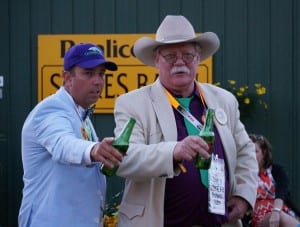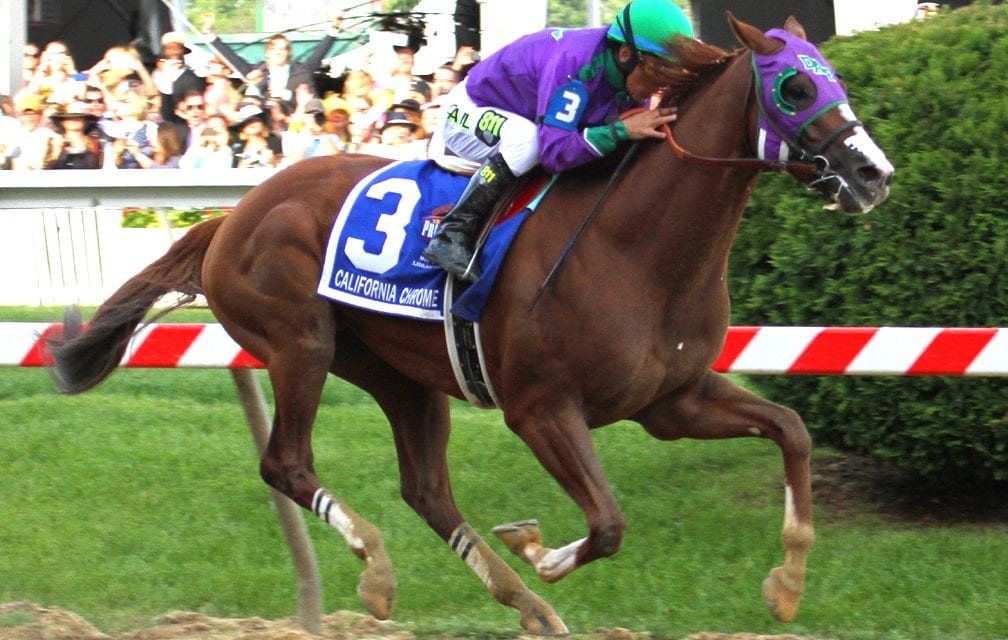by Frank Vespe

Steve Coburn (right), co-owner of California Chrome, celebrates at the post-Preakness party. Photo by Vas.
It was as predictable as night following day that the same impulses that made us love Steve Coburn would ultimately lead us to turn on him.
Of course, Coburn, the 61 year-old, chrome-haired co-owner of foiled Triple Crown aspirant California Chrome, made it easy. In the immediate aftermath of Saturday’s Belmont Stakes, Coburn, in a televised interview, blustered that winner Tonalist’s having skipped the first two legs of the series before showing up in the Belmont was “the coward’s way out.” (He has since apologized.)
To run in the Belmont, he went on to say, a horse should be required to have raced in the Kentucky Derby and the Preakness.
The proposal is, of course, an absurd one — but it’s one that Coburn has consistently advocated since at least before the running of the Preakness. So it can’t have come as a surprise to anyone that he would endorse it as steadfastly in defeat as he did in victory.
And, yes, his language was over the top. It’s hardly cowardice that Tonalist’s connections — trainer Christophe Clement and owner Robert S. Evans — didn’t run him in the Kentucky Derby; in fact, he had not qualified for the Derby and did not make his graded stakes debut until the week after the Derby, in Belmont’s Peter Pan. Recognizing that their horse is a later-developing runner is good management, not cowardice.
Still, when Coburn was atop the racing world, he was the lovable outsider routinely described as “brash” and “outspoken.” When he predicted — before the Kentucky Derby — a Triple Crown for his homebred, we called it endearing.
When he suggested limiting Triple Crown participation in an “all or nothing” format, we said, “Well, he wants to shake up the business, and that’s a good thing, right?”
 And now? Now he’s a sore loser, a blustering buffoon with a signature stupid idea.
And now? Now he’s a sore loser, a blustering buffoon with a signature stupid idea.
This reaction tells us more about us than it does about Coburn.
In our media-saturated cultural moment, we want — demand — “genuine” emotion and “honesty,” which we roughly define as “emotion that I can see on a TV screen.” The old coaching advice to players — “Act like you’ve been there before” — now seems as quaint as a Model T. The only “there” that it’s worth having been is on SportsCenter, and one of the surest ways to get there is by over-the-top celebration.
It’s not bragging if you can back it up, we tell each other, channeling our inner Muhammad Ali (and ignoring that, in fact, backing it up has nothing at all to do with whether it’s bragging or not).
And so we’ve reached the moment where we want bad winners — who pose and preen and announce their own greatness — and good losers who say all the right things, which is as backwards a combination as we’re likely to come up with.
The cameras loved the big, burly guy with a beer in his hand and a penchant for speaking his mind — until the exact moment when we didn’t want him to speak his mind anymore. And then, suddenly, we wanted him to speak in vague platitudes about the grandeur of the game, the honorableness of his opponents, the magical ride on which California Chrome took him.
It’s strange, how quickly we move from admiration to irritation. Following California Chrome’s Kentucky Derby victory, Joe Drape, in The New York Times, wrote that, though Coburn was certainly brash and perhaps had offended some in the industry, “all was forgiven” when Chrome rolled to victory.
Five weeks later, after his Belmont outburst, Andrew Beyer, in The Washington Post, called him “a graceless and clueless bad sport.“
What changed? The result of the race, for one thing, and in the aftermath of Chrome’s Belmont defeat, it turned out that the last thing we wanted from Steve Coburn was genuine emotion.








I totally agree. Many loved that Coburn was so emotional. People thought the tears at the Preakness were endearing and genuine, and they were. People should expect an emotional person to be emotional when they have just had dream crushed. Many people can probably relate to feeling devastated, but how many had a camera and a microphone in their face right at the moment of that devastation?